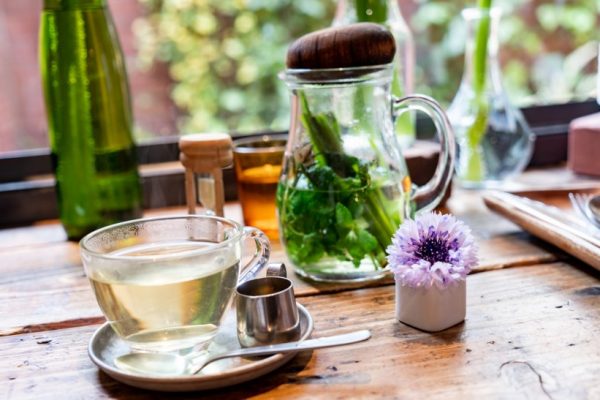
9 Herbal teas – benefits & side effects
Herbal teas made from leaves, roots and flowers have multiple benefits. Antioxidants present in these herbs yield many health benefits. If you are an herbal tea drinker, you must know the uses as well as possible side effects of herbal teas.
. Tulsi tea: Holy basil or Tulsi plant has many medicinal properties. Tulsi leaves tea are good for lungs, relieves congestion, relieves stress, good for oral health, keeps blood sugar at bay.
Tulsi tea is easy to prepare. Boil a cup of water, add few Tulsi leaves. Let it steep. Strain and drink tea.
Tulsi tea contains eugenol and ursolic acid. Do not consume more than one or two cups a day.
- Mint tea: Both Tulsi and mint belongs to same family. Like Tulsi, mint leaves tea is good for respiratory disorders, removes congestion and good for weight loss.
To prepare mint tea, boil water and steep few leaves. Strain and drink hot mint tea.
Mint has strong odor. High amount of mint can cause nausea, vomiting, heart burn and dry mouth.
- Rose hip tea: Rose hip contains rose seeds. Dried rosehip is used for herbal medicines. It contains Vitamin C. Drinking rose hip tea supports immune system, good for heart, aids weight loss, reduces body inflammation and skin aging.
If you are planning to prepare rose hip tea, you can use dried as wells as fresh rose hips. Collect and wash rosehips. Mash rose hips. Boil water and add rose hip. After one boil, remove and strain tea. You can add lemon juice or dried lemon peel to rose hip tea for additional flavoring.
Getting addicted to rosehip tea can cause constipation, kidney stones, fatigue and heart burn.
- Rosemary tea: Drinking rosemary tea keeps you in alert condition. Polyphenols present in rosemary are responsible for anti-inflammatory property. It also helps to balance blood sugar level.
Steep rosemary leaves for about 3 mins. In hot water. Strain and drink the tea. You can mix rosemary with thyme or lavender too. Drinking more than two cups of rosemary tea can cause irritation in stomach.
Ingesting more rosemary can lead to heartburn, headache, nausea, stomach irritation, allergy, miscarriage
- Thyme tea: It is good for gastrointestinal problem and helps to reduce lung congestion, cold and cough.
For hot water add few thyme leaves, let it steep for 3-4 mins. Strain and drink the tea.
For some people, drinking thyme tea can cause headache, dizziness or system upset.
- Raspberry leaf tea: For centuries raspberry leaf tea has been used in treating menstrual cramps, to prepare womb for delivery and to regulate period cycles. Red raspberry tea is popular for its taste which is similar to regular tea minus caffeine.
To two cups of water boiling water, add 1 tsp of dried raspberry leaves or 4-5 leaves of fresh raspberry. Let it steep for few minutes. Strain and drink the tea.
Raspberry has laxative property. Drinking too much raspberry tea can cause loose stool, fatigue and has diuretic affect resulting in dehydration.
- Lemon balm tea: If your nerves are hyperactive & feeling jittery then take help from lemon balm tea. It helps to calm and get balanced.
Easy to prepare. Pick leaves, rinse, pat dry and steep in hot water. You can also dry leaves and store. Steep dried lemon balm leaves when you want it.
Stomach pain, painful urination, dizziness, irritation in respiratory tract, vomiting are potential cause of high lemon balm tea intake.
- Lavender tea: Another tea to calm your nerves and to set your mind to ease. Flowers of lavender are used for relaxation purposes. It is a good sleeping aid.
To 2 cups boiled water, add 4 tsp of fresh lavender buds (or 2 tsp dry flower). Steep it for 5-10 mins. Strain and drink.
Lavender can cause headache, increased appetite and sometime irritation in system.
- Mulberry tea: White mulberry tree leaves are hailed as superfoods. The tea is believed to inhibit absorption of carbohydrates by our system. Helps to stabilize sugar level. It is recommended for weight loss.
To prepare mulberry tea, use fresh or dry leaves. To one cup boiling water, add desired amount of leaves. Steep it for 5-7 mins. Strain and drink.
Drinking too much mulberry tea can cause diarrhea, bloating and constipation. It can also cause skin irritation, hives.
Precautions for herbal tea intake:
- People who have preexisting condition, women who are pregnant must contact their physicians before taking herbal tea.
- If you are getting herbal tea from store, then read label. It will give your warning, precautions, dosage and how to use.
- Buy herbal tea from store that has more turn over. Old tea loses fragrance & flavor.
- If you are preparing tea at home, get to know about the herb fully, before you are using it. Do not assume all-natural herbs are safe.
- Most herbal teas can interact and interfere with medications. Do not mix medications and herbal tea. It is better to give minimum 2 hours gap between consumption of herbal tea and taking medication.
- Consider drinking herbal tea morning or evening. Avoid drinking tea during your medication time.
- Pregnant women and lactating mothers should not consume herbal tea unless, it is recommended by your OBGYN.
Image source: Photo by Sebastian Sammer on Unsplash (Free for commercial use)
Author: Sumana Rao | Posted on: January 6, 2025
« Propolis From Honey Bees Has Many Medicinal Properties Reasons Why Green Gram Is Recommended In Diet Program »






















Write a comment